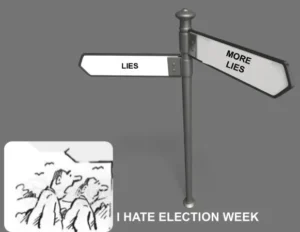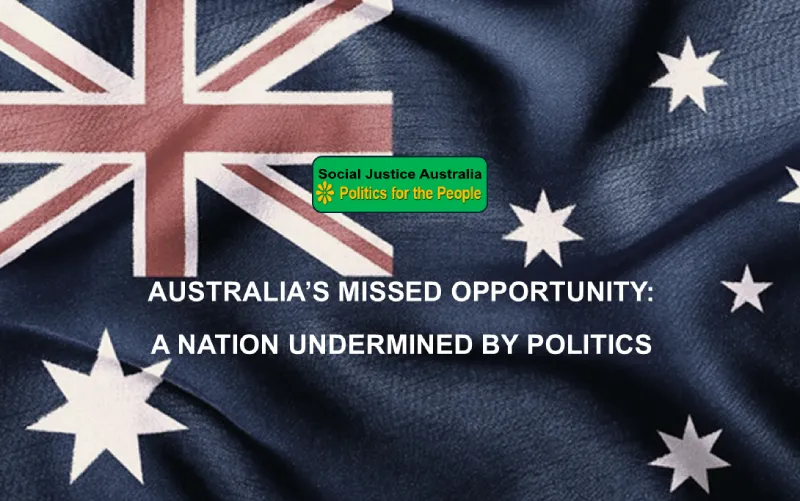Description
Political disillusionment grips Australia. Explore the scandals and eroding civil rights that led to a nation run by second-rate leaders and what we can do next.
1. The Moment Politics Became Personal – Children Overboard

Location: Sydney, 2001. An election loomed, and a refugee boat sank off Australia’s coast.
Action: Prime Minister John Howard claimed refugees threw their children overboard.
Thoughts & Emotions: Many believed it. “What kind of people would do that?” asked one voter on talk back radio. The truth? They didn’t. It was a manufactured lie.
Result: Howard won the election, weaponising fear and racism to keep power. This event awakened many Australians to political deception.
2. Colonial Legacy and Leadership Failure
Historical Context: Since colonisation, Australia has followed the British Westminster system. However, with 70% of the past century ruled by the Liberal/National coalition, real reform has been scarce.
Action: Wealthy politicians protect their class interests.
Quote: Donald Horne wrote in The Lucky Country: “Australia is run mainly by second-rate people who share its luck.”
Reflection: The promise of an egalitarian society faded under small-minded leadership lacking national vision.
3. Racism and the National Identity Crisis
Location: Outback communities to inner-city cafes.
Action: The public votes down The Voice referendum.
Thoughts: “Why should they get special treatment?” asked some. The real question: why are First Nations people still asking for recognition on their own land?
Historical Echoes: From the White Australia Policy to fear campaigns about being “swamped by Asians,” racism is embedded in our politics.
Fact: Australia ranks among the most racist OECD countries (source).
4. Media Monopoly and the Murdoch Factor
Location: NewsCorp headquarters, Sydney.
Action: The Murdoch press steers public opinion, shields political allies.
Fact: 59% of Australian daily newspaper circulation is owned by NewsCorp (source).
Result: Scandals involving the LNP are buried or reframed. Public accountability is lost.
Emotion: A deepening sense of despair grows among politically aware citizens.
5. Erosion of Civil Liberties in Modern Australia
Action: Over 200 civil rights removed via legislation since 2000.
Real Story: Environmental protestors face jail. Journalists like Bernard Collaery face prosecution for revealing government wrongdoing.
Reflection: Australia now criminalises peaceful protest and whistleblowing.
Comparison: Singapore punishes corruption. We punish transparency.
6. Political Disillusionment: What It Really Means
 Definition: Political disillusionment refers to the loss of trust in political institutions, leaders, and processes. In Australia, it has reached a point where many citizens believe the system no longer serves them.
Definition: Political disillusionment refers to the loss of trust in political institutions, leaders, and processes. In Australia, it has reached a point where many citizens believe the system no longer serves them.
Real Stories: Voters across the nation express a recurring sentiment—“What’s the point? Nothing changes.” From young people burdened by student debt to pensioners who feel abandoned, disillusionment spans generations.
Emotions: Frustration, apathy, and anger are common. These feelings aren’t born from ignorance, but from lived experience—broken promises, systemic neglect, and leaders who seem more loyal to donors than to the people.
Data: According to surveys by the ANU, trust in the federal government has dropped significantly over the last two decades (source).
Why It Matters: Political disillusionment is dangerous not because people stop voting, but because they stop believing change is possible. That’s when democracy begins to fail.
7. Public Apathy and the Death of Civic Engagement
Quote: “I don’t vote. They’re all the same.”
Thoughts: This disinterest stems not from ignorance, but from deliberate depoliticisation.
Mechanism: Capitalist culture discourages political discussion—”Don’t talk politics at the dinner table.”
Action: Football and celebrity gossip replace democratic discourse.
Reflection: Apathy is the triumph of political manipulation.
8. Religious Resurgence and American Influence
Location: Parliament, Canberra.
Action: Rise of evangelical Christian politicians.
Parallel: Reflects U.S. fundamentalism influencing policy.
Story: Laws prioritise religious freedoms over women’s rights or LGBTQ+ protections.
Emotion: For secular Australians, this is an alarming drift away from pluralism.
9. The Way Forward: Reclaiming Democracy
Problem: Governance lacks vision, courage, and transparency.
Solution:
• End media monopolies with regulation.
• Fully fund public education and services using Australia’s dollar sovereignty.
• Enforce accountability through independent anti-corruption bodies.
• Support community-led movements and independent candidates.
Example: Singapore’s anti-corruption model shows that good governance is possible.
Action: Use your vote, your voice, and your money wisely. Support independent platforms.
10. Conclusion: Grieving for What Could Have Been
Australia had every advantage: natural resources, a vibrant multicultural society, and a history of social innovation. But through apathy, media manipulation, and second-rate leadership, it squandered much of its potential.
Yet, it is not too late.
By awakening the public to their power and reimagining our political systems, Australia can become a nation that truly reflects the best of its people—not just the luck of its geography.
Q&A Section
Q1: Why is political awareness in Australia so low?
A deliberate depoliticisation effort discourages civic debate and hides systemic issues behind media distractions.
Q2: How can we fight back against media monopolies?
Demand independent regulation, fully fund public broadcasting, and support diverse independent news outlets.
Q3: Is community-driven change realistic in Australia?
Yes. With Australia’s dollar sovereignty, public money can fund grassroots movements, local media, and independent political candidates.
Question for Readers
Do you believe Australia can overcome its political disillusionment, reclaim its political integrity, and become the visionary nation it was meant to be?
Call to Action
If you found this article insightful, explore more on political reform and Australia’s monetary sovereignty at Social Justice Australia. :https://socialjusticeaustralia.com.au/
Share this article with your community to help drive the conversation toward a more just and equal society.
Click on our “Reader Feedback”. Please let us know how our content has inspired you. Submit your testimonial and help shape the conversation today!
Additionally, leave a comment about this article below.
Support Social Justice Australia – Help Keep This Platform Running
Social Justice Australia is committed to delivering independent, in-depth analysis of critical issues affecting Australians. Unlike corporate-backed media, we rely on our readers to sustain this platform.
If you find value in our content, consider making a small donation to help cover the costs of hosting, maintenance, and continued research. No matter how small, every contribution makes a real difference in keeping this site accessible and ad-free.
💡 Your support helps:
✅ Keep this website running without corporate influence
✅ Fund research and publishing of articles that challenge the status quo
✅ Expand awareness of policies that affect everyday Australians
💰 A one-time or monthly donation ensures Social Justice Australia stays a strong, independent voice.
Thank you for being part of this movement for change. Your support is truly appreciated!

